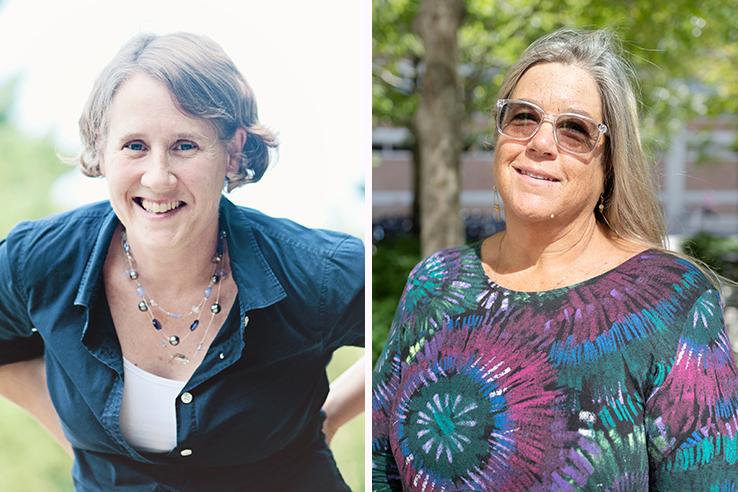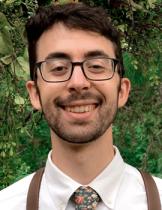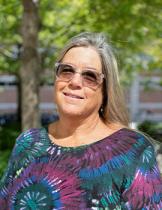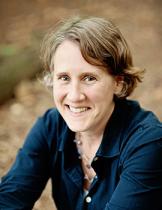
Get to know J-PAL North America’s associate directors of policy and research

Kim Dadisman and Cat Darrow, the associate directors of J-PAL North America’s policy & communications and research & training teams, discuss their backgrounds before coming to J-PAL North America, highlights from their work at J-PAL so far, and their top priorities for the year ahead.
What first brought you to J-PAL North America?
Cat: J-PAL had been on my radar for a few years as a really well-regarded organization whose mission and core values all really appealed to me. I come from a background in education. My original professional identity was as a teacher: I taught middle school, mostly sixth-grade history, for several years. It was a lot of fun and I learned a lot, but I also saw first-hand unequal access to education resources and the barriers different students faced in accessing opportunities. You can do a lot in education from the classroom, but it can be really hard to address systemic issues like lack of access and opportunities.
After being in the classroom, I studied learning, teaching, and diversity in graduate school, and then worked in several different research organizations, all focused on education policy evaluation. In these roles, I saw how education and education policy is often trying to address the harms poverty can cause, and I really grew to appreciate the need for rigorous research to guide us.
Kim: I came to J-PAL North America in 2018. I first encountered J-PAL when I was working in an evaluation role in Jakarta, and I was really impressed with their focus on applying research findings to helping policymakers make better policies. I was drawn by the desire to work at a place that had full-pipeline impact, from the early steps of supporting studies through engaging with policymakers to improve the lives of people experiencing poverty using the rigorous research we’ve generated. I had worked at different stages of that research-to-action pipeline before and wanted to take the next step in my journey by putting it all together.
What has inspired you most about your work at J-PAL thus far?
Kim: During the four and a half years that I’ve been with J-PAL, one thing that stands out most is the people. This place has the smartest, most intentional, and most generous, collegial staff I've ever worked with. I absolutely love having conversations with colleagues: it's always interesting, I always learn something, and my work always goes better than if I had pursued it alone.
One ongoing focus area for me has been our work on high-impact tutoring. Our evidence review on tutoring came out shortly before Covid, and tutoring has become elevated as one of the clearest ways to help kids catch up on lost time in the classroom. Working to accelerate student learning has led to impactful and rewarding engagements at so many levels. We’ve met with advisors for the Biden transition team to share key insights from the evidence—and were later thrilled to see this summer’s launch of the National Partnership for Student Success, which commits resources toward 250,000 tutors and mentors over the next three years. That’s huge. We are also collaborating with education leaders in New Mexico and California on implementing tutoring at scale with fidelity to the evidence. And we’re continuing to share our work and learn from the work of other organizations like Results for America and the Annenberg Institute.
Cat: I can’t speak to four years on the job yet, but my first three months have been great! The thing about J-PAL North America is that everyone I've interacted with, in every instance, has been such a thoughtful person. Institutionally, it’s clear we all encourage each other to be thoughtful, to take a little time to think deeply about things before we jump into action. And that’s not the case in every job, right?
One thing I was pleasantly surprised to learn within our research and training team is that the work entails knowing a lot about a lot of things. Sometimes we’re focused on research methods and methodologies; sometimes we’re looking at the context and background conditions that enable a randomized evaluation to be feasible, ethical, and valuable; other times we’re working to more consistently embed racial equity into rigorous research. Members of our team have different expertise and specialities, but on any given topic or opportunity, we can find staff and J-PAL affiliated researchers who are both interested in the topic and highly capable of supporting rigorous research on it.
What are your top priorities for the coming year?
Kim: Cat and I are taking over the world at some point. It might take more than a year, though.
Cat: It’s good to have some long-term goals.
Kim: In all seriousness, one priority is continuing to work with state and local governments as they leverage American Rescue Plan funds to evaluate new program models or scale ones backed by evidence. We’re working to go deeper with states in particular, and to develop relationships where we can act as a useful partner by connecting agencies with our fantastic network of affiliated researchers. By definition, state and local governments work across every single sector—from education, to health, to labor force development—so deepening and expanding relationships within a state or jurisdiction that enable rigorous research on multiple topics is a focus.
Cat: I would like to continue J-PAL North America’s work to make randomized evaluations more accessible to anybody who's interested. That applies both to researchers who are preparing to run their first randomized evaluation and to anyone who wants to understand and interpret study designs and results.
I’m excited for the Economics Transformation Project to continue working to create a pipeline to a more equitable, inclusive field of economics. Going back to my teaching days, more economics education could be happening in middle school and high school, and could be a path that younger students may want to pursue, but not enough of them necessarily know what a career in economics could offer. We’re also thinking about how to learn from the model of the African Scholars and Indian Scholars programs run by other J-PAL regional offices.
And finally, across the board in my career, I’ve seen a shift in how seriously people take research transparency and accessibility. Our work needs to be easy to find, easy to read, and easy to understand. We do a lot of that already—take, for example, our evaluation summaries and research resources—but I’m eager to further expand it. The more people we bring into the fold as producers and consumers of rigorous evidence, the more successful we will be in our unifying goal of improving lives by translating research into action.




